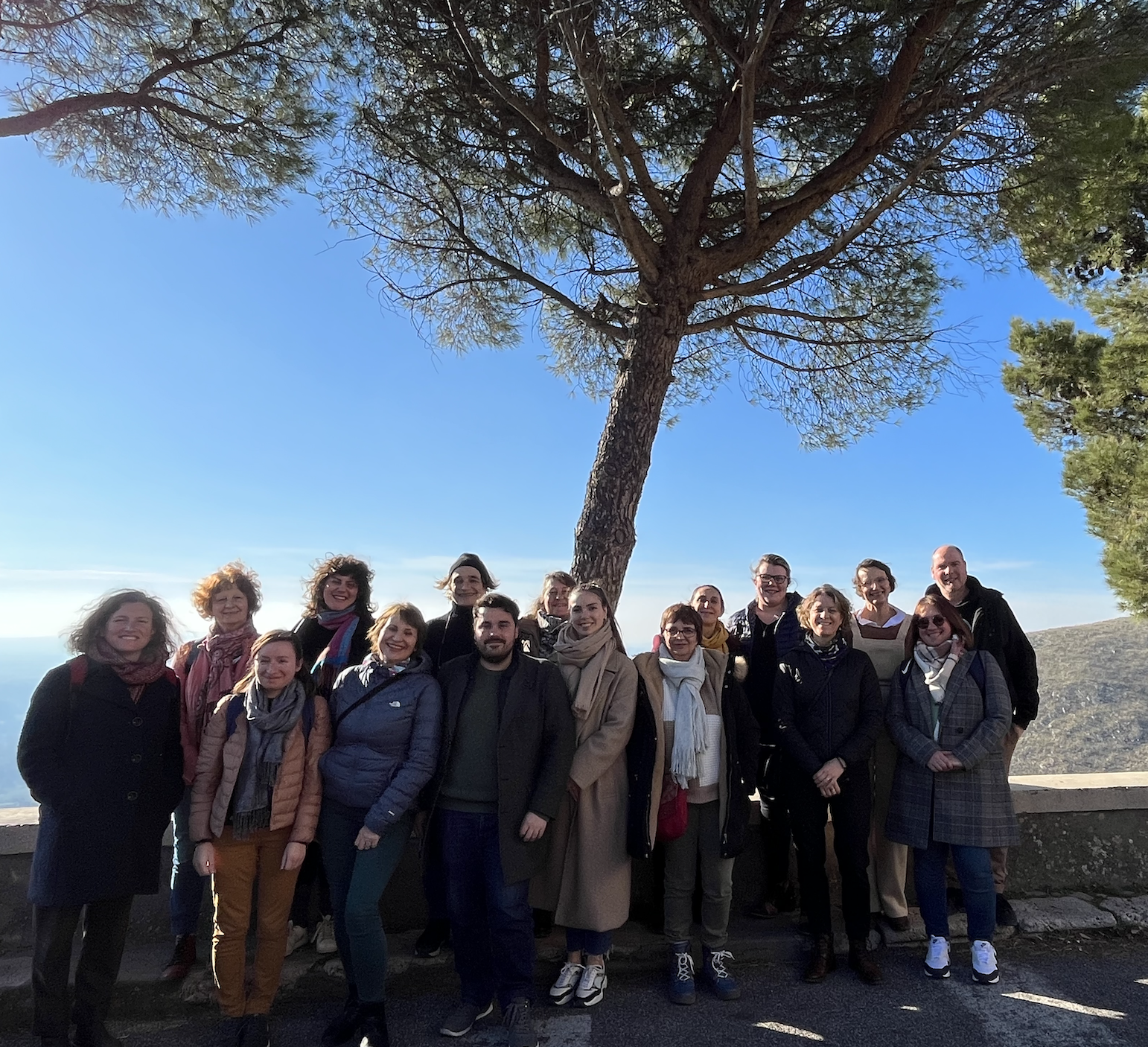From 29 January to 2 February 2024, the ACCR, several members of the CCR network and partners went on an Erasmus+ mobility trip to the Potlach Theatre in Italy. This learning stay, organised in partnership with the Abbaye aux Dames, provided an opportunity to question the involvement of local communities in an artistic and cultural project.
Etymologically, Potlach means to give change. It's a ceremony practised in particular by the indigenous tribes of North America, during which clans compete in prodigality, either by destroying objects or by making gifts to the rival, who is in turn forced to give more. So it's a dynamic of reciprocal exchange that dictates behaviour. Théâtre Potlach is part of this spirit of give-and-take that helps to create a sense of community.
Through a summer theatre festival, an artistic season, work in schools, numerous partnerships and the Invisible Towns programme, Théâtre Potlach reaches out to local communities and residents to offer accessible, cross-disciplinary theatre (digital, music, circus). Based on this inspiring example, the teams collectively reflected on their positioning.
/Listening to local residents
To facilitate its integration into the village, Théâtre Potlach carried out anthropological work with local residents to determine the reasons for their reticence about its artistic offerings and to find out what would interest them. Reassuring local people means reaching out to them, listening to and understanding their feelings and daily lives, and talking about what concerns them, because audiences are going to see what belongs to them. The villagers have a certain culture of choirs, folklore, dance and dialect theatre that we had to understand.
Following this analysis, the company adapted its project to offer a staging of the history of the village around the cohabitation of the two monasteries. Several performances took place, this time attracting local residents. A bond of trust was forged: the villagers felt listened to, and their traditions and visions of society were not shaken. For example, the company chose not to tackle certain subjects, such as politics or relationships.
This work on trust has also resulted in the company opening up to local residents, inviting them to live with them for a day. This attention to transparency greatly encouraged people to get to know each other.
Over and above the subjects addressed, the local people were not used to the new theatrical format proposed, i.e. a central stage without a podium, performances outside the walls, close proximity of the actors who challenge the audience, etc. We had to be educational in order to help the audience understand the disappearance of the fourth wall.
/Involving local people
The attention paid to local people goes hand in hand with a change in their status: they are no longer seen as passive spectators, but as full players in the creative process. This new relationship is based on direct emotional involvement, the senses being the primary instruments of knowledge. Culture makes it possible to develop a special bond insofar as it creates memories.
The involvement is also more tangible. Théâtre Potlach has put on shows in residents' homes, using their cellars and gardens as performance spaces. In this way, each resident has a full role to play in the company's projects. Residents' interest in the theatre's activities has been heightened by the choice of these spaces. Through these new ways of interacting with the public, the actors have succeeded in creating a close relationship that is conducive to cooperation.
The French CCRs have also shared their actions in favour of a rethought relationship between artists and audiences, such as Abbaye aux Dames, which still organises residency outings open to the public and which, during its festival, calls on a large number of volunteers who have free access to the concerts.
While keeping the concept of cultural democracy as a cherished value, the teams also agreed on the need to play down the quantitative aspect and accept the choice of audiences not to take an interest.
/The territory as a space and material for creation
By involving local people and their heritage (both tangible and intangible), Théâtre Potlach offers a real human adventure. The company has developed a number of off-site street arts projects, enabling people to (re)discover places that are hidden or, on the contrary, commonplace but no longer seen because they are caught up in the spiral of everyday life. We see the city as a large, malleable set, an infinite playground for breaking the rhythm of everyday life. Cities naturally offer a scenography that has a memory. With this in mind, two separate projects have been developed: Invisible Cities and an Augmented Walk.
Invisible cities /
The Invisible Towns festival offers a new way of looking at the city, where the usual routes are turned upside down by draping and lighting effects that make it unrecognisable. New walks are proposed, leading from one play to another. These new spaces are like cities to be discovered.
Each artist has his or her own space, which could be a balcony, a staircase or a narrow alleyway. An interdisciplinary project to occupy the city, the forms of dramaturgy proposed are as varied as the number of artists present. The artists are responding to the challenge of rethinking their relationship with their performance spaces. For example, tango dancers can perform on an old stone staircase, far from the dance hall floor to which they are accustomed.
Théâtre Potlach sets out an itinerary lasting around two hours, guiding spectators with visual and musical choices. One of the special features of the street arts is the free movement of audiences, so it's important to develop techniques that capture their attention without seeming to constrain them. In the interests of accessibility, we give priority to shows without words: body art, music, singing...
The company was keen to offer a large-scale performance of high artistic quality outside the metropolises, thereby promoting the richness of the regions.
Augmented stroll /
During the pandemic in 2020, the Théâtre Potlach team embarked on a digital project to talk about the village's heritage in a different way. To do this, they approached a company specialising in the digitisation of heritage, with the aim of creating a tour accessible on smartphones and producing a short film in which the actors interact with local residents.
Objects from the collections of the city's archaeology museum were added to these video clips. These objects have been digitised so that they can be inserted as central elements of the story.
In this way, the built heritage, the exceptional natural environment of the village, the local people and their artefacts are all showcased and told in their own words.
/Making places of heritage and creation welcoming places
The notions of well-being and welcome were at the heart of our reflections. The Théâtre Potlach has endeavoured to create a warm environment conducive to conviviality, exchange and trust. The open spaces, for example, are decorated in warm colours and there is plenty of flexible seating. The aim is for the audience to feel at home here.
One of the keys to this feeling of well-being is the shared meals. Meals are times when people come together to talk freely and get to know each other better. It's a moment of availability that encourages listening to others and sharing passions. When we eat together, we stick together and naturally feel closer, sharing the same moment and being confronted with the same flavours. Again, according to the Potlach concept, offering a meal or a snack is a form of giving, a way of expressing openness towards others. During the Abbaye aux Dames festival, for example, you can come and have a drink in the courtyard, without attending a concert, just to enjoy the atmosphere.
Joining in with popular festivals is another way of getting close to people and making them feel at home. Many CCRs, such as Abbaye aux Dames and Chartreuse de Neuville, take part in local festivities such as Christmas markets, farmers' markets, Halloween, village school festivals, sporting events and so on. For example, the Saline Royale had to contend with a certain lack of interest from local people for a time, due to an elitist and closed image of the site. To break down this image, the Saline has been chosen as the venue for a trail race in October 2023. Hosting major popular annual events helps to open up the site, create exceptional moments and make them a ritual.
This is one of the strengths of the CCRs, which take a popular approach as well as meeting cultural requirements. The CCRs are driving forces in this new relationship with culture. This balance creates a stronger sense of belonging and familiarity, and, by extension, pride in sharing this common heritage.
/Toolbox
The CCRs also returned to the question of mobility, a particularly sensitive issue given their location in rural areas, some of which are very isolated. While some hire or buy minibuses to provide shuttle services, Noirlac Abbey is testing the "Covoiturage simple" platform. Dedicated to cultural and sporting events, the platform brings together people with common interests. At first sight simpler and less restrictive than a shuttle bus for users, it also helps to create links between visitors beforehand.







